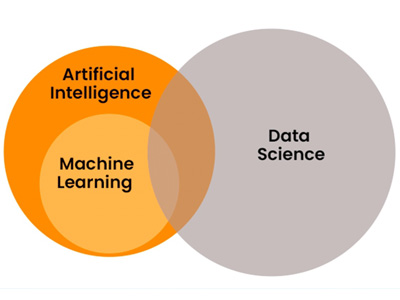Artificial Intelligence vs Machine Learning vs Data Analytics: What You Need To Know?

As per G2, AI can increase business productivity by 54%. Also, 15% of organizations are advanced Machine learning users. These stats just show how AI, machine learning, and data analytics are directing the modern world and are supposed to do the same in the near future also. Although we do need all three scientific advancements to expand and solve business problems, it's crucial to understand each of these terminologies separately to measure their impact.
What is Artificial Intelligence?
As per Forbes, at least two of the top 10 global retailers will establish robot resources by 2025. In addition to this, 77% of retailers plan to introduce AI by 2021 for warehouse picking and maintaining inventories. AI technology is a technology that combines human abilities with the theory and development of computers. In short, its focus is to create human-like robots that can perform tasks that demand human abilities. Nowadays, AI is also known as narrow AI. This means it's designed to perform tasks like facial recognition, decision-making, and visual observation which are single tasks. And it does that extremely well since it focuses on one problem at a time.
What is Machine Learning?
It is the science of preparing computers to predict the best outcomes without being processed to do so. It is not surprising that machine learning has enhanced effective web search, practical speech recognition and improved the perception of output and input values in a device. In scientific terms, machine learning can be defined as studying computer algorithms that help improve different computer programs. It also mirrors the way humans learn since it's a branch of AI only. As a result, so many giant companies support and incorporate new ways of predicting consumer behaviors and machine learning. It acts as a helping hand for these organizations. It helps you analyze the trends in customer behavior, which supports the development of new products and adds products for you.
What is Data Analytics?
As per business to community states, 67% of CEOs believe their businesses could improve the knowledge of their clients if they manage their data properly. Data analytics is a concept which supports both the side whether its human or machine enabled data. It's the process of operating with data to draw outcomes about the information they hold. It discovers, interprets, visualizes, and uses tools and techniques to stimulate business strategy and receive good outcomes. If executed well, it can help you establish trends, discover opportunities, and predict events or actions.
Artificial Intelligence vs Machine Learning – What's the Difference?
Artificial intelligence is linked to the theory of minds, reactive machines, memory, and learning abilities, while machine learning is on a different spectrum. Its an application of AI that provides machines all the necessary data to improve accuracy in tasks. It uses algorithms and programs to solve significant business dilemmas. Here are few differences between them: The main goal of AI is to make devices and machines imagine, behave and perform tasks as humans, but in the case of ML, the focus is on research and coding to allow machines to grasp the data and produce the desired output. In practice, AI uses deep learning, neural networks, and cognitive computing to gather data, analyze it and promote business automation processes. For example, it handles multichannel listing, customer engagement, follow-up purchases and automates ad-targeting through AI-based algorithms. On the other hand, ML explores data and software to identify patterns and improve their algorithm learning. AI performs almost similar to humans and can selfcorrect, understand, and learn. In ML programs, they perform designated tasks on a limited range. Its self-correction and learning techniques work when disclosed to a set of data.
Data Analytics vs Artificial Intelligence
AI indeed includes expert systems and human intelligence processes as an upside, but data analytics has the power of data. Let's explore the difference between these two. AI uses different tools like TensorFlow, PyTorch, to function. They also use different types of data like vectors and embedding. On the other hand, data analytics uses SAS and Python to run structured or focused on uncovering patterns. The process and technique of AI are futuristic and based on algorithms in computers to solve human-oriented problems. When it comes to data Analytics, its process involves visualization, pre-processing of data, and extracting valuable insights from the same. The main goal of data analytics is to formulate and look for patterns, while AI aims to bring automation to life. For instance, maintaining email hygiene and customer satisfaction rate is paramount for business automation.
Data Analytics vs Machine Learning
Metaphorically speaking, data analytics is a type of purification where data is inspected, cleaned, and transformed, but machine learning is all about the algorithms and codes that fit data science. If you're confused about the future of artificial intelligence, think about robotics, IoT, big data, and other creative technologies that will solve various problems both for industries and people. Well, the difference between the two lies in their techniques. Data analysis is all about software and tools deriving numbers, but machine learning is based on web app development methods, algorithms, and statistics. Data analytics also includes multiple processes like data science, software engineering, data engineering, etc. In the case of machine learning, the focus is to create human-like artificial intelligence systems.
Conclusion
We understood that they all have similarities and are still different from each other. Businesses and people can now scale and increase their efficiency to work with the help of AI, machine learning, and data analysis. So, leverage these emerging technologies wisely and skyrocket your business to achieve optimum goals.
(This "Security Blogs" Published in June 2023 Edition)













